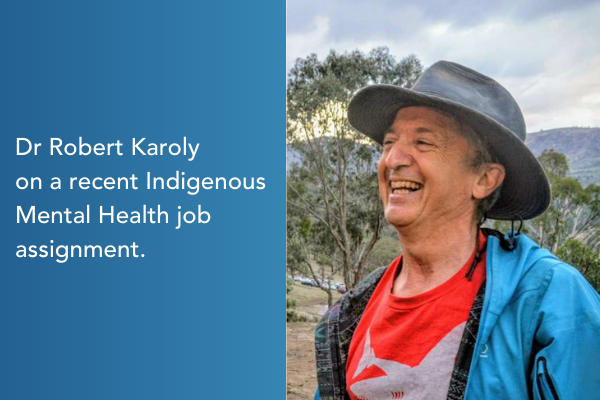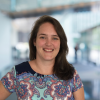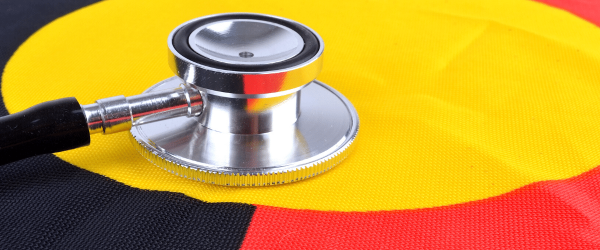The Unique Experience of a Locum Doctor Working in Indigenous Mental Health
“The 2021 National Reconciliation Week theme, More than a word. Reconciliation takes action, urges the reconciliation movement towards braver and more impactful action.”
This is a time to remember the importance of “privileging and amplifying First Nations’ voices as we add our voice to calls for reconciliation and justice”.
Claire Ponsford and Dr John Bethell (Wavelength International’s Founders) had this at the forefront of their minds when they first established the Wavelength International Indigenous Medical Scholarship in 2011, which was launched to support an Indigenous student commencing their undergraduate studies at UNSW Medicine.
Claire and John, have spoken about how in the work that we do here at Wavelength, we can often see where the gaps are in the health and medical services across the country. They wanted to give back and to help with closing the gap in Rural Australia particularly within Indigenous communities, in a way that tied in with what Wavelength does on a day-to-day basis.
What is it like to work in Indigenous Health?
As part of Reconciliation Week here at Wavelength, we are taking the opportunity to spread awareness of the history behind Reconciliation Week and what we can do as a nation to move forward on equality and recognition of Australia’s First People.
In aid of this, we have been speaking to some of our doctors that work with AMS (Aboriginal Medical Services) and also in Indigenous Health.
We had the privilege of catching up with one of our Locum Consultant Psychiatrists, Dr Robert Karoly, who has does a lot of work in Indigenous Mental Health.
Rob retired from his full-time position in Melbourne eight years ago and has since been working in remote communities with the Darwin Remote Mental Health Service and Top End Mental Health Service, as well as some Remote and Indigenous locums across Australia through Wavelength.
We discussed with him what the work is like, the unique experiences he’s had and the locations he has been able to visit since working in Indigenous Mental Health.

How did you get started working in Indigenous Mental Health?
I decided to retire from my inpatient position in Melbourne and managed to move into remote Psychiatry work with Top End Mental Health and the Darwin Remote Mental Health Team.
With these teams, we are honoured to be invited into remote Aboriginal communities with other healthcare workers.
Have you seen anything in your years working in AMS/Indigenous Mental Health that you think could be avoided if there were more Doctors in this specialty area?
There are very few Doctors that only visit remote communities. Most of the services are city-based, so it would be good if there were more Specialist staff that could visit these communities on a more regular basis, as more of a main job, rather than a sidearm to their main work in city-based services.
What’s your view on how well serviced these areas are? Do you feel they have enough Doctors? Where do you see the most need?
They are reasonably well serviced by Mental Health Nurses, which is great. However, the Psychiatry Registrars would only be visiting quarterly, and the Specialists are only going once every 6 months.
A lot of the services are concentrated in the large towns, rather than the remote communities and so there are not as many Aboriginal-specific services available.
Was there a particular experience or placement that struck a chord with you?
The remote communities are very unique and working with the people I’ve met has really struck a chord. Particularly going into Arnhem land, where you need to be invited and issued with a permit, to travel into the area. This is such an honour and a unique experience to be able to have.
What does a typical day look like for you working in AMS/Indigenous Mental Health?
There are no typical days! You’re working attached to the medical clinic, and in the mornings, we have handovers and hear about any overnight crisis’ that may have occurred (e.g. self-harm). You would then get your patient list and will most likely be hopping into a 4wd to head out to the stations, with the Aboriginal Health Workers.
It’s not the same as in other services around the country. You’re not going into people’s homes, as that’s just culturally not how it works. They live in communities and do everything together, so you’re likely to be sat speaking with someone and their whole family, under a tree.
What activities do you get involved in on your days off?
It’s quite difficult, as these communities are very private culturally, however, there are lots of Indigenous activities and ceremonies to see and get involved in too.
What type of qualities does it take for a doctor to work in AMS/Indigenous Mental Health?
You need to be really willing to have an open mind and be confident in making decisions – listening well, but you also can’t be wishy-washy, because you’re not going to get to see them again for a while. You will need to be prepared for anything coming through the door, and be decisive.
You must be culturally sensitive! There is “anti-racism” training as the local Indigenous call it (Cultural Sensitivity Training). Anyone who wants to work in the AMS I would strongly encourage you to look on the RANZCP website and complete their modules on working in Indigenous Mental Health.
You need to be confident working independently and comfortable making decisions and you need to be able to work collaboratively with the Aboriginal Workers and other medical staff. You will also need to be able to put up with some discomfort – it is very hot and humid, and some of the towns you visit can be quite confronting.
What has surprised you the most?
The resilience of the communities and the hardship they put up with. Food security is a real issue and a proportion of the people are starving. 24%* of Indigenous Australians experience food insecurity and 30%* of Indigenous adults are reporting being worried about going without food.
However, their humour and resilience is inspiring. They are upfront with you and prefer people that are respectful but upfront as well.
My nickname is “The Bird” (from flying in and out to see them on a plane).
*Australian Institute of Family Studies.
What improvements have you noticed in the last few years?
Cultural awareness has really improved. Now there are Aboriginal Doctors training as Psychiatry Registrars, which is really fantastic and an improvement. There needed to be a holistic approach, and this has been improved over the last couple of years.
More can be done, however, as growing the Aboriginal and Torres Strait Islander Doctor workforce, and shaping a culturally safe health care system more broadly is a dynamic and long-term process.** According to the Department of Health, in 2014, 261 out of the 85,510 employed medical practitioners in Australia- or 0.31% - identified as Aboriginal and/or Torres Strait Islander. Reaching population parity would require the addition of approximately 2,300 more Aboriginal and Torres Strait Islander Doctors. **Australian Indigenous Doctors’ Association
Do you have any advice for Doctors considering work in AMS/Indigenous Mental Health?
Do the modules on your relevant College’s website (e.g. RANZCP, RACP, RACGP… etc). Whatever service you want to join, ask for their Cultural Awareness Training.
Do some reading on the areas you’re going to, the issues faced there, what kind of work you’ll be facing, and especially their history. It is not going to be the same as the Indigenous patients you may have seen in the larger cities.
Don’t go in thinking you know it all – humble Doctors will be better received and go further. You’ll get the opportunity to make a little bit of a difference and learn a lot! It is an absolute privilege to be able to work with the original inhabitants of Australia, and it will be a steep learning curve, but very worth it.
What do you find the most rewarding about working in AMS/Indigenous Mental Health?
I think to be able to have access to people and parts of Australia, that you wouldn’t otherwise be able to see.
Working with a group of First Australians, who are very proud of their country and it’s a privilege to be invited to work with them and visit them.
Are you ready to make a difference to a community in need? Search the Aboriginal Medical Services and GP Indigenous jobs we have available.
You can also speak to our AMS recruitment team to see how they can help find a role to suit you. For GP AMS opportunities, contact us.



